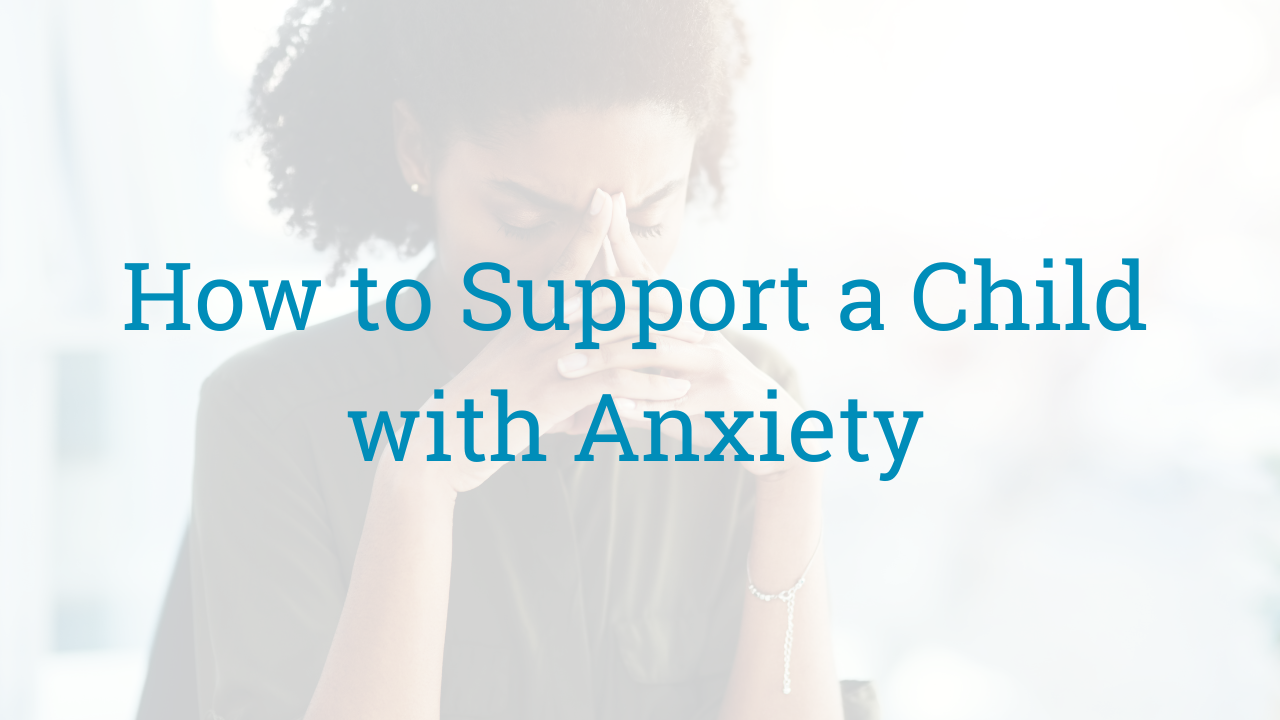
How to Support a Child Recently Diagnosed with Anxiety
When a child is diagnosed with anxiety, it can be a challenging and emotional time for both the child and their family. Understanding how to support them effectively can make a significant difference in helping them navigate their feelings and manage their anxiety.
Here are some key steps to support a child with an anxiety diagnosis:
1. Educate Yourself and Your Child
The first step in supporting your child is to educate yourself about anxiety. Understanding the condition helps reduce any fears or misconceptions, both for you and your child. Sit down with your child and explain anxiety in an age-appropriate way, using simple terms. Let them know that feeling anxious is a normal part of life and that they are not alone.
2. Create a Supportive Environment
Children with anxiety often feel overwhelmed and misunderstood. It’s important to create a safe and supportive environment at home where your child feels comfortable expressing their feelings without judgment. Encourage open communication, listen actively, and let them know that it’s okay to have anxious feelings.
3. Establish Routine and Predictability
Anxiety thrives in uncertainty. One of the most helpful things you can do is establish a consistent daily routine. Having a clear schedule for school, meals, homework, and bedtime can help your child feel more secure and in control of their environment. Routines can ease anxiety by reducing the unknowns.
4. Practice Coping Strategies Together
Teach your child coping strategies to manage their anxiety. Breathing exercises, mindfulness techniques, and progressive muscle relaxation are all effective tools. Practice these strategies together so your child can learn to use them in moments of anxiety. Over time, these tools can help them feel more in control of their emotions.
5. Encourage Healthy Habits
Physical health is deeply connected to mental well-being. Encourage your child to engage in regular physical activity, maintain a balanced diet, and get enough sleep. A healthy body can help regulate the nervous system and reduce the intensity of anxiety.
6. Seek Professional Support
While family support is crucial, working with a mental health professional can provide your child with additional tools to manage their anxiety. Here at Next Step 4 Mental Health, a mental health professional trained in child anxiety can guide your child in understanding their triggers and developing healthier thought patterns.
Cognitive-behavioral therapy (CBT) is a proven method for treating anxiety in children and can make a huge difference.
7. Be Patient and Understanding
Supporting a child with anxiety takes time and patience. Progress may be slow, and there may be setbacks, but it’s important to celebrate small victories along the way. Encourage your child to take things one step at a time, and reassure them that it’s okay to seek help when they need it.
At Next Step 4 Mental Health, we understand that each child’s experience with anxiety is unique, and we are here to help both children and families navigate this challenging journey.
If you’re looking for additional support or guidance, reach out to us today. Together, we can help your child build resilience, learn coping skills, and thrive despite anxiety.
Learn More
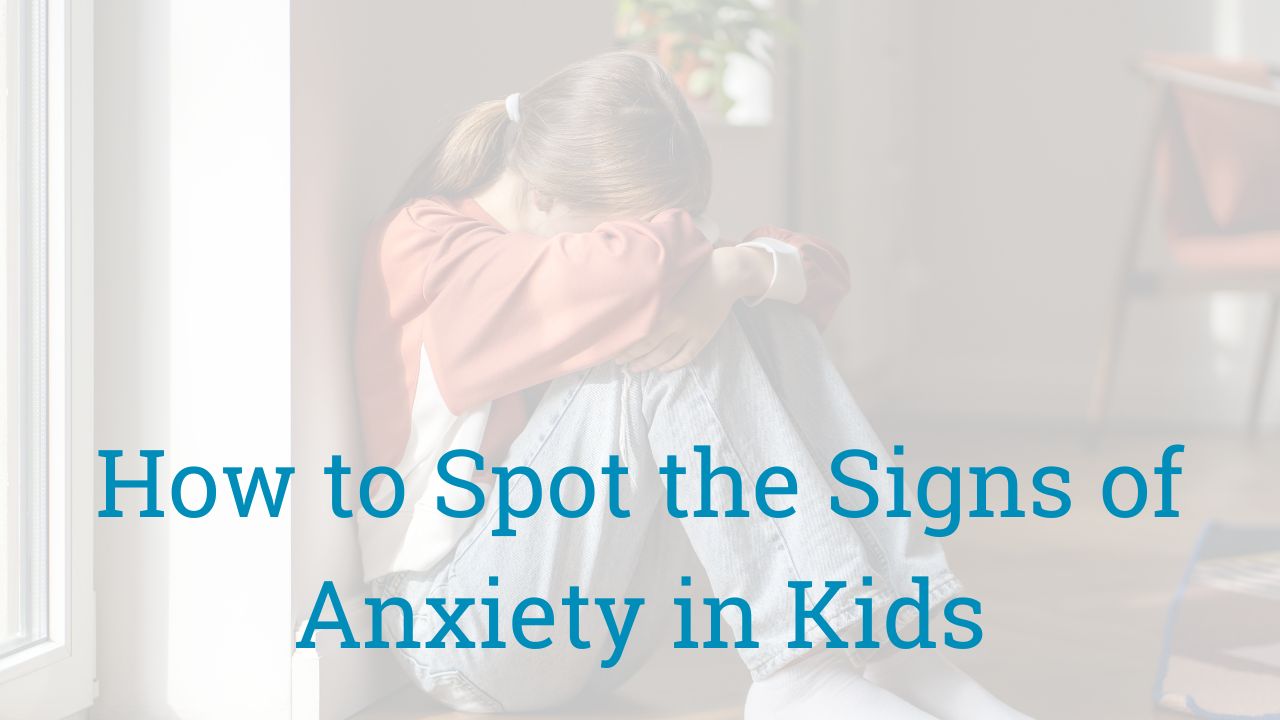
How to Spot the Signs of Anxiety in Kids
Anxiety is a common challenge among children, and it can often go unnoticed as kids may struggle to express their feelings. As a parent or caregiver, it’s important to know the signs so you can help your child cope with anxious feelings.
Here are some key signs of anxiety in kids to watch for:
1. Excessive Worry
Children with anxiety often worry excessively about everyday situations. They might express fear about going to school, meeting new people, or participating in activities they used to enjoy. This worry may seem disproportionate to the situation, which leads them to focus on worst-case scenarios.
2. Physical Symptoms
Anxiety often manifests physically. Your child may complain of stomachaches, headaches, or other unexplained pains, particularly before stressful events like school or social outings. They may also experience rapid breathing, dizziness, or fatigue when anxious.
3. Avoidance Behaviors
Kids who are anxious may avoid certain activities, people, or places that trigger their anxiety. This could include refusing to go to school, avoiding social interactions, or expressing fear about new experiences. These avoidance behaviors can sometimes interfere with their everyday routines.
4. Restlessness and Trouble Sleeping
Restlessness, fidgeting, or being unable to sit still can be signs of anxiety. Additionally, anxiety can disrupt your child’s sleep, causing nightmares, difficulty falling asleep, or frequent waking during the night.
Read this blog to learn how your lighting can impact your sleep.
5. Irritability and Mood Swings
Children with anxiety may become irritable or easily frustrated. Mood swings, especially in situations that would not normally be stressful, are another common sign.
How to Help Your Child
If you notice any of these signs in your child, it’s important to take action. Encouraging open conversations, validating their feelings, and teaching relaxation techniques can help. If the anxiety persists or affects their daily life, reaching out to a mental health professional can provide the support and tools needed to manage their anxiety effectively.
How Dr. Sofeia Aslam at Next Step 4 Mental Health Can Help
 Dr. Sofeia Aslam specializes in working with children and adolescents and offers a compassionate and effective approach to treating anxiety. Her expertise in child and adolescent psychiatry makes her the right fit for helping children navigate their anxiety and regain a sense of peace and confidence.
Dr. Sofeia Aslam specializes in working with children and adolescents and offers a compassionate and effective approach to treating anxiety. Her expertise in child and adolescent psychiatry makes her the right fit for helping children navigate their anxiety and regain a sense of peace and confidence.
With Dr. Aslam’s guidance, your child can learn coping strategies, develop emotional resilience, and improve their overall mental well-being. If you’re noticing signs of anxiety in your child, Dr. Aslam is here to help.
Contact Next Step 4 Mental Health today to schedule an appointment and take the first step toward supporting your child’s mental health.
Learn More
8 Mental Health Tips for Fall: Managing the Seasonal Shift
As the days get shorter and the temperatures drop, it’s common to feel a shift in mood and energy levels. The decreasing daylight in the fall can impact your mental health, but there are steps you can take to stay balanced.
Here are some tips to help you manage the seasonal change and protect your well-being.
1. Embrace Natural Light
With fewer daylight hours, it’s important to make the most of natural light. Spend time outdoors during the day, especially in the morning, to boost your mood and energy. If getting outside is tough, try to position yourself near windows to absorb as much sunlight as possible.
2. Maintain a Regular Sleep Routine
The shift in daylight can disrupt your sleep-wake cycle. Establish a consistent sleep schedule to help regulate your body’s internal clock. Aim for 7-9 hours of sleep each night, and avoid screens before bedtime to encourage better rest.
You can learn more about how light affects your sleep here.
3. Stay Active
Exercise is a powerful mood booster, especially when the darker days make you feel sluggish. Whether it’s a brisk walk, yoga, or a workout at the gym, staying physically active can increase endorphins and help combat feelings of fatigue or sadness.
4. Practice Mindfulness
Mindfulness practices like meditation, deep breathing, or journaling can help you stay grounded during the seasonal transition. Set aside a few minutes each day to focus on your mental and emotional well-being, reducing stress and improving your mood.
Try this guided muscle relaxation before bed:
5. Connect with Others
Fall can bring a sense of isolation as the days grow shorter, so it’s important to stay connected with friends and family. Regular social interaction, even virtual, can help combat loneliness and provide emotional support during this time of year.
6. Keep Your Diet Balanced
What you eat can have a big impact on how you feel. Focus on nourishing foods that support your mental health, like leafy greens, whole grains, and omega-3 rich foods like salmon or walnuts. Avoid relying on sugary snacks or caffeine, which can lead to energy crashes and mood swings.

7. Consider Light Therapy
If you find that the lack of daylight significantly affects your mood, light therapy may be an option. Light boxes can mimic natural sunlight, helping to alleviate symptoms of seasonal depression.
Before beginning light therapy, it is important to consult with a physician for recommendations regarding wavelength, dose, duration, timing, etc.
8. Don’t Hesitate to Seek Help
If feelings of sadness, fatigue, or anxiety become overwhelming or persistent, reaching out to a mental health professional can be beneficial. Seasonal Affective Disorder (SAD) is a form of depression that’s triggered by seasonal changes, and it’s important to get the support you need if you’re struggling.
How Next Step 2 Mental Health Can Help
At Next Step 2 Mental Health, we understand how the change in seasons can impact your emotional well-being. Our team of mental health professionals is here to support you through this transition, offering therapy, counseling, and tailored treatment plans for managing seasonal challenges.
Don’t wait to take action—reach out to us today to learn how we can help you maintain your mental health this fall and beyond.
Learn More
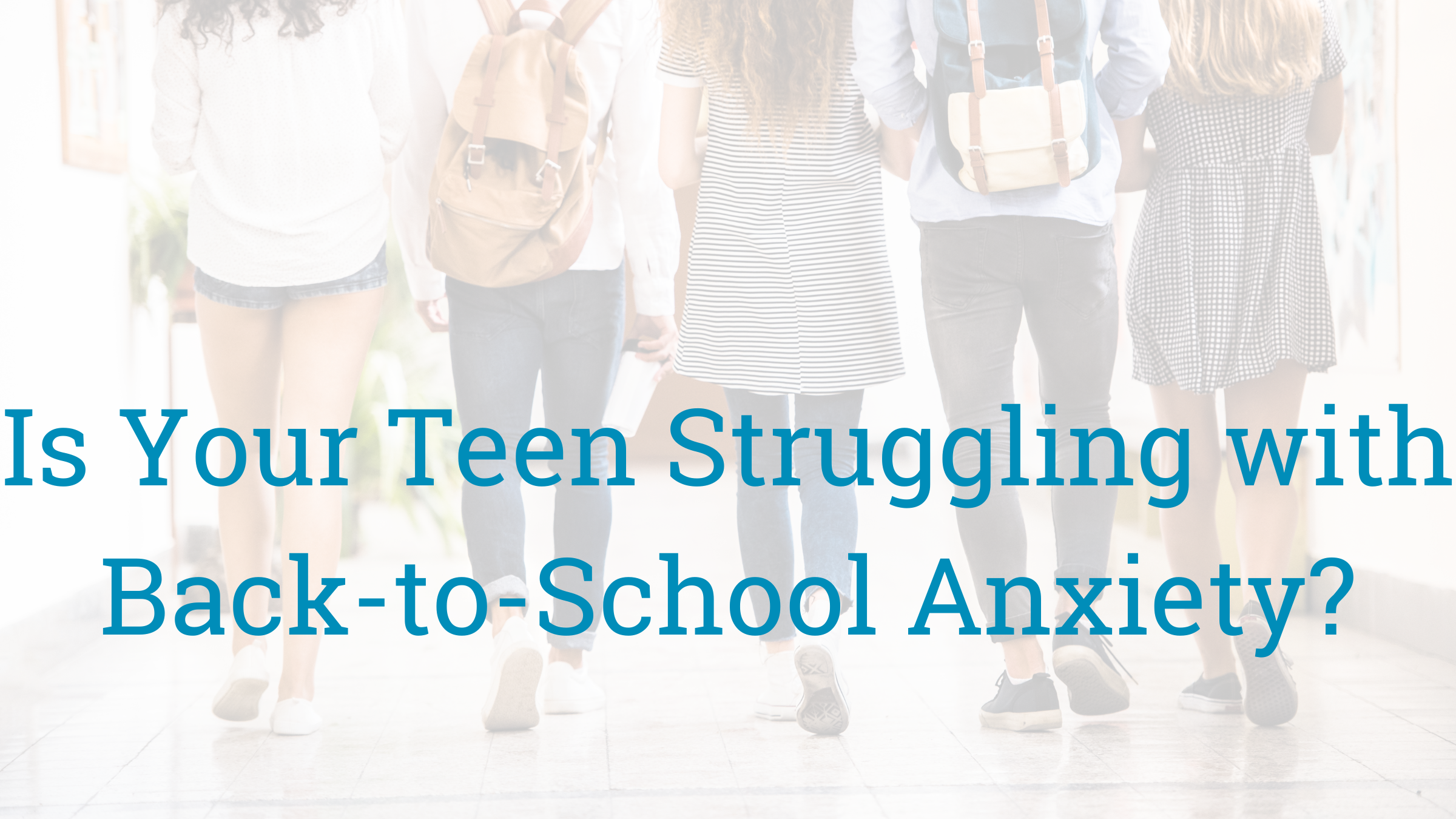
Managing Back-to-School Anxiety in Teens
As the new school year begins, many teens experience a mix of excitement and anxiety. For some, the prospect of returning to school can be overwhelming and lead to heightened stress and anxiety.
Understanding the sources of this anxiety and implementing strategies to manage it can help teens navigate the school year with confidence and resilience.
Here’s what you need to know.
Understanding the Sources of Anxiety
Back-to-school anxiety in teens can stem from various factors, including:
- Academic Pressure: The fear of not meeting academic expectations can be a significant source of stress. Teens may worry about grades, exams, and the ability to keep up with coursework.
- Social Concerns: Friendships and peer relationships are crucial during adolescence. Worries about fitting in, making new friends, or dealing with bullying can contribute to anxiety.
- Changes in Routine: The shift from a relaxed summer schedule to a structured school routine can be jarring. Adjusting to early mornings, homework, and extracurricular activities can be challenging.
- Uncertainty and Change: Starting a new school, entering a different grade, or having new teachers and classmates can create feelings of uncertainty and fear of the unknown.
Signs Your Teen is Struggling with Anxiety
It’s important to recognize the signs that your teen may be struggling with back-to-school anxiety.
These can include:
- Physical Symptoms: Complaints of headaches, stomachaches, or fatigue without a clear medical cause may indicate anxiety. You can read more about some of the lesser-known symptoms of anxiety and depression here.
- Changes in Behavior: Your teen may become withdrawn, irritable, or have difficulty concentrating. They might also avoid school-related activities or express reluctance to attend school.
- Sleep Disturbances: Difficulty falling asleep, staying asleep, or waking up feeling unrested can be linked to anxiety. Learn how lighting can impact sleep in Monica Clark’s post here.
- Appetite Changes: Anxiety can lead to changes in eating habits, such as loss of appetite or overeating.
If you notice these signs, it’s important to address the issue and provide support. Early intervention can prevent anxiety from escalating and impacting your teen’s overall well-being.
Strategies to Manage Back-to-School Anxiety
There are several effective strategies you can use to help your teen manage back-to-school anxiety:
- Open Communication: Encourage your teen to talk about their worries and fears. Listen without judgment and validate their feelings. Knowing they have a safe space to express their concerns can be reassuring.
- Problem-Solving Together: Work with your teen to identify specific stressors and brainstorm solutions together. Whether it’s time management, making new friends, or handling difficult subjects, helping them develop a plan can reduce anxiety.
- Practice Relaxation Techniques: Teach your teen relaxation techniques such as deep breathing, mindfulness, or progressive muscle relaxation. These can be useful tools for managing anxiety in the moment.
- Establish a Routine: Help your teen establish a consistent daily routine that includes time for homework, relaxation, and social activities. A predictable schedule can reduce the stress of uncertainty.
- Encourage Social Connections: Encourage your teen to maintain and build social connections. Whether through extracurricular activities, clubs, or simply spending time with friends, strong social ties can provide emotional support.
When to Seek Professional Help
While many teens experience some level of anxiety when returning to school, severe or persistent anxiety may require professional intervention. If your teen’s anxiety is interfering with their daily life, causing significant distress, or if you notice signs of depression, it may be time to seek help from a mental health professional.
At Next Step 2 Mental Health, we offer specialized support for teens dealing with anxiety and other mental health challenges. Our team of professionals can work with your teen to develop coping strategies and provide the tools they need to manage anxiety effectively.
Here for You
Back-to-school anxiety is a common experience for many teens, but with the right support and strategies, it can be managed effectively. By understanding the sources of anxiety, recognizing the signs, and implementing practical coping techniques, you can help your teen navigate the school year with confidence.
If your teen’s anxiety persists or becomes overwhelming, don’t hesitate to seek professional help. With the right care, your teen can thrive both academically and emotionally. Click here to schedule an appointment with us.
Learn More

Finding the Right Child Psychiatrist in Louisville, Kentucky
Parenting a child with mental health challenges can be both rewarding and demanding. Whether your child is grappling with anxiety, depression, or other mental health issues, witnessing their unique perspective on the world comes with its highs and lows. If you’re in search of a child psychiatrist in Louisville, the good news is that Louisville, Kentucky, boasts a strong community of child psychiatrists ready to assist.
Here are the essential tips you need for finding the right child psychiatrist in Louisville.
Mental Health Concerns Are Common…
According to the Centers for Disease Control and Prevention (CDC), anxiety problems, ADHD, and depression are the most commonly diagnosed mental disorders in children. Approximately 5.8 million children aged 3-17 years have anxiety, while another 2.7 million have depression.
Mental health challenges can affect both children and adults, presenting symptoms such as mood swings, changes in behavior, and difficulties in coping with daily life. Diagnosing and managing mental health conditions requires specialized knowledge and skills, making the role of child psychiatrists crucial.
Why Choose a Child Psychiatrist in Louisville, Kentucky?

Louisville is home to a growing number of child psychiatrists who specialize in diagnosing and treating mental health conditions such as anxiety and depression in children. Here are some key reasons why seeking their help is beneficial:
- Expertise: Child psychiatrists have extensive training in child and adolescent mental health. They understand the nuances of diagnosing and treating many conditions (and comorbid conditions), tailoring their approaches to each child’s unique needs.
- Comprehensive Evaluation: Child psychiatrists take a holistic approach to assess your child. They not only evaluate the symptoms your child currently has, but they also consider any co-occurring conditions, environmental factors, and family dynamics that may impact your child’s well-being.
- Medication Management: In some cases, medication may be part of your child’s treatment plan. Child psychiatrists are well-equipped to prescribe and manage medications, ensuring your child’s safety and effectiveness.
- Behavioral Interventions: Child psychiatrists can provide guidance on evidence-based behavioral interventions and strategies to help manage symptoms, both at home and in school.
- Support for Families: Managing a mental health diagnosis can be challenging for the whole family. Child psychiatrists in Louisville offer guidance, resources, and support to parents and caregivers, helping them understand and cope with their child’s condition. You can read more here:
- Collaborative Care: Child psychiatrists often work closely on our multidisciplinary team, such as psychologists, therapists, and ADHD coaches, to provide a comprehensive and coordinated treatment plan for your child. This means that everything you need is all under one roof.
Finding the Right Child Psychiatrist in Louisville, Kentucky
When searching for a child psychiatrist in Louisville, consider the following steps:
- Ask for Recommendations: Reach out to your pediatrician, school counselor, or support groups for recommendations. They may have valuable insights into trusted professionals in the area.
- Research Credentials: Ensure the psychiatrist is board-certified and has experience in child and adolescent psychiatry.
- Consultation: Schedule a consultation to meet with the psychiatrist, discuss your concerns, and evaluate their approach and compatibility with your child.
- Communication: Open and effective communication with the psychiatrist is key. You should feel comfortable discussing your child’s needs and asking questions.
Why NextStep4MentalHealth?
NextStep4MentalHealth is committed to providing comprehensive resources and support for families dealing with mental health challenges. We understand the importance of child psychiatrists in managing these conditions and aim to connect parents and caregivers with qualified professionals who can make a significant difference in their children’s lives.
Our team page offers a user-friendly interface that allows you to search for child psychiatrists in your area who specialize in various mental health issues. We believe that access to the right healthcare professionals is a critical step in the mental health management journey.
Raising a child with mental health challenges can be a rewarding journey with the right support system in place. In Louisville, Kentucky, you have access to a dedicated community of child psychiatrists who can provide expert guidance and assistance. Remember that you’re not alone in this journey, and with the help of a knowledgeable child psychiatrist, you can empower your child to thrive and reach their full potential. Don’t hesitate to seek the support your family needs to make the journey with mental health challenges a successful one.
Click here to schedule an appointment with us today to explore the benefits of multidisciplinary care here in Louisville, Kentucky.

Navigating the Holiday Season: Support for Those Sandwiched Between Childcare and Caring for Aging Parents
The Holiday Stress for the Sandwich Generation
Recognizing Symptoms of Anxiety and Depression
- 8 Risk Factors for Depression
- 11 Ways to Help Someone with Depression
- Anxiety at Christmas
- What Is Generalized Anxiety?
The Importance of Self-Care
- Setting achievable expectations
- Delegating tasks
- Setting aside ample personal time for relaxation and enjoyment

Support Systems and Resources
Establishing a support network is vital. This network can comprise friends, family, and community resources. Support groups tailored for the sandwich generation or caregiver support can provide a sense of community and understanding.
Seeking Professional Help
Here for You

Seasonal Marketing and Social Media: Navigating the Perfect Storm for Fall Anxiety
Is the thought of the upcoming holidays (and all of the marketing associated with them) leaving you less-than-thrilled? Does seasonal marketing already trigger feelings of anxiety? Read on as Dr. Briscoe shares tips for navigating seasonal marketing and social media “perfection” during this holiday season.
You know it’s fall when, in one aisle of the store, you’re picking out Halloween candy and, in the next, you’re greeted with Rudolph the Red-Nosed Reindeer singing Christmas carols. Seriously, didn’t we just pack away the sun hats and beach towels?
Now, amidst the cooling breezes of October, marketers are nudging (read: shoving) us into a festive frenzy. First, we’re urged to plan our spookiest Halloween shenanigans, only to turn a corner and be told to prep our turkeys for Thanksgiving. And let’s not forget the mountains of tinsel and ornaments nudging us towards Christmas before the trick-or-treaters even knock on our door. Can we just breathe and enjoy one holiday at a time?
It’s all good fun until we start feeling the pressure. The media’s whirlwind portrayal of ‘perfect’ holidays can leave us feeling like we’re racing against an impossible standard. Those perfectly curated Facebook photos of our friends’ fall festivities? I promise, behind every flawlessly carved pumpkin is a kitchen that looks like it’s been through a pumpkin apocalypse.
The constant bombardment of early holiday marketing, paired with the social media myth of everyone ‘having it all together,’ can exacerbate anxiety. Generalized Anxiety Disorder (GAD) isn’t just occasional stress; it’s a persistent, excessive worry about a variety of things. It can be debilitating. And when the world around us insists we should be orchestrating the perfect fall, it can feel like we’re perpetually falling short.
However, it’s essential to remember that it’s okay not to be okay.
Learn More About Anxiety
You can read more about anxiety in the following articles:
- 9 Surprising Ways Anxiety Shows Uup In Kids
- Depression and Anxiety in Teens
- Seasonal Affective Disorder
- 7 Ways to Manage Social Anxiety
More about Dr. Briscoe

Brian Briscoe, MD, is a board-certified psychiatrist with over a decade of private practice experience. Dr. Briscoe founded the practice in 2011 which grew into a multidisciplinary group, Next Step 2 Mental Health, in Louisville, Kentucky. Dr. Briscoe provides compassionate and nonjudgmental care to adults of all ages.
You can read his full bio here.
Need Help Managing Anxiety?
To make an appointment with Dr. Briscoe, click here.
Learn More
How Teens Can Deal with Back-to-School Anxiety
An upset stomach. Nightmares. Unrelenting desire to avoid school. Difficulty sleeping. These are all examples of how anxiety can manifest in teens. Sometimes, these signs of anxiety are mistaken for symptoms of another condition. For example, you might think that your stomachache was caused by something you ate. The truth, though, is that anxiety can be hidden in plain sight, and as we enter back-to-school season, you might start to see the signs of back-to-school anxiety.
Whether you’re starting your final year of junior high or starting your first year of college as an 18-year-old, anxiety can flare up during the back-to-school season. In this article, we share tips and strategies for reducing anxious feelings during the school year.
1. Practice Deep Breathing Exercise
When people (teens or otherwise) feel anxious, they may subconsciously take shallow, quick breaths. These chest breaths can increase heart rate, muscle tension, and even contribute to dizziness. Taking slow, deep breaths can help you shift from chest breathing to abdominal breathing. When teens slow down their breathing, it helps to shift out of flight or fight mode so their body can relax. Isn’t science cool?! Slow, deep breaths — that’s the key!
You can do square breathing or triangle breathing, or you can follow along with guided meditations. The following videos are cute ways to introduce the idea of deep belly breathing to young children.
2. Spend Time in Nature
Nature is healing, and it can do wonders for easing anxious thoughts. Sometimes teens benefit from simply changing up the scenery. You might even considering doing some homework outside after school if the weather allows for it. As you breathe in the fresh air, feel the breeze rustle your hair, or listen to the birds chirp, your thoughts are gently calmed.
This is a great opportunity to practice a grounding technique. Monica Clark, LPA, explains this technique:
If you find yourself beginning to lose focus, ground yourself in the moment. One effective grounding technique is the 5-4-3-2-1 Game. In this technique, you ground yourself in the physical environment by naming:
- 5 things you can see
- 4 things you can hear
- 3 things you can feel against your skin
- 2 things you can smell
- 1 thing you can taste
Describe the smells, find green leaves, describe the texture of a pebble.
3. Talk about What Anxiety Is
“Anxiety is often regarded as something that is bad and should be eradicated completely. However, anxiety by itself isn’t necessarily bad. Anxiety is actually an emotion that helps us take care of dangerous situations — and respond to those situations. If we are aware of a potentially dangerous situation, we can avoid harm,” says Dr. Dan Guy.
In other words, worry and fear is designed to help us avoid potentially dangerous situations. For example, a stray dog charging at your may instill fear, and it’s that fear that ignites flight or fight mode — so you can take flight to safety. Problems arise when anxiety and fear is triggered outside of dangerous situations — like feeling physically anxious even if there isn’t a dog nearby.
It’s tempting to remove all anxiety triggers because we don’t want to be unhappy, but the goal is to help manage anxiety because experiencing some degree of anxiety is part of what it means to be human. For example, if you feel anxious about this school year, you may ask to skip a day of school. While skipping a day of school might temporarily ease your mind, it won’t be helpful in the long-term nor will it help you manage anxiety. Instead, it’s more helpful to learn how to manage anxiety.
4. Exercise More
Exercise is good for your body and mind — and that’s true for teens too. The above video depicts an easy at-home workout that you can perform after school without any equipment needed! But that’s not the only option. Other good-for-the-brain exercises include:
- Hiking
- Playing sports like soccer or basketball (even if it’s in your backyard)
- Rollerblading
- Biking
- Dancing
- Jump rope
Walking around the block is a good option too!
5. Focus on Good Nutrition
Good nutrition impacts your mental health too! In fact, there are plenty of tasty brain-healthy foods, such as:
- Salmon
- Yogurt
- Turmeric
Not all teens enjoy salmon, but a yogurt-lemon-dill sauce may make the salmon more appetizing for those who aren’t used to eating it. You can also make salmon loaf, which eliminates the fish texture that you might not like.
TIP: If you have a stomachache caused by anxious thoughts, you may not feel like eating. If that’s the cause, try more bland foods (like chicken noodle soup) or a warm cup of chamomile tea.
6. Read a Book
Teens can learn important life lessons through reading — plus, reading is a good relaxing activity! Review this list of books via NowPysch, and you might discover some great books for teens with anxiety.
7. Create a Safe Space
If you are feeling overwhelmed, you may benefit from a cozy place to unwind after school. From fidget spinners to books to coloring books, this can be a great way for teens to process all of their thoughts after school — rather than jumping right into homework or chores.
8. Ask for Individual Accommodations
For some teens, accommodations at school can make all the difference when it comes to anxiety. For example, if a student struggles with performance anxiety, he or she may not do well when taking tests. Some students benefit from individual accommodations such as extended time on tests. For other accommodations for kids who struggle with anxiety, check out this list from The Children’s and Adult Center for OCD and Anxiety.
9. Practice Good Sleep Hygiene
Poor sleep and anxiety often go hand-in-hand. Anxious thoughts can make it difficult to sleep, and poor sleep can exacerbate the symptoms of anxiety. Help your child practice good sleep hygiene, including:
- Going to bed at the same time every night
- Using warm-colored lights during his or her bedtime routine
- Sleeping in a cool, dark room
10. Go Over New Changes
Reduce back-to-school anxiety by going over any new changes with your parent or teacher. Maybe you feel unsure about the new rules at school. Sometimes just a quick refresher on what’s expected can go a long way in feeling confident about the new school year.
11. Reach Out to Us
The good news about anxiety is that it can be treated with therapy, medication, and lifestyle changes. With the right support and strategies, most teens are able to develop strategies that help them manage their anxiety both in the classroom and at home.
Here at Next Step 2 Mental Health, we provide comprehensive mental health care for children (and teens too!). Whether you are just now experiencing anxiety for the first time, or is seeing a resurgence in symptoms, we can help you get the relief you deserve. Call 502-339-2442 or send us a message to request more information.
Learn More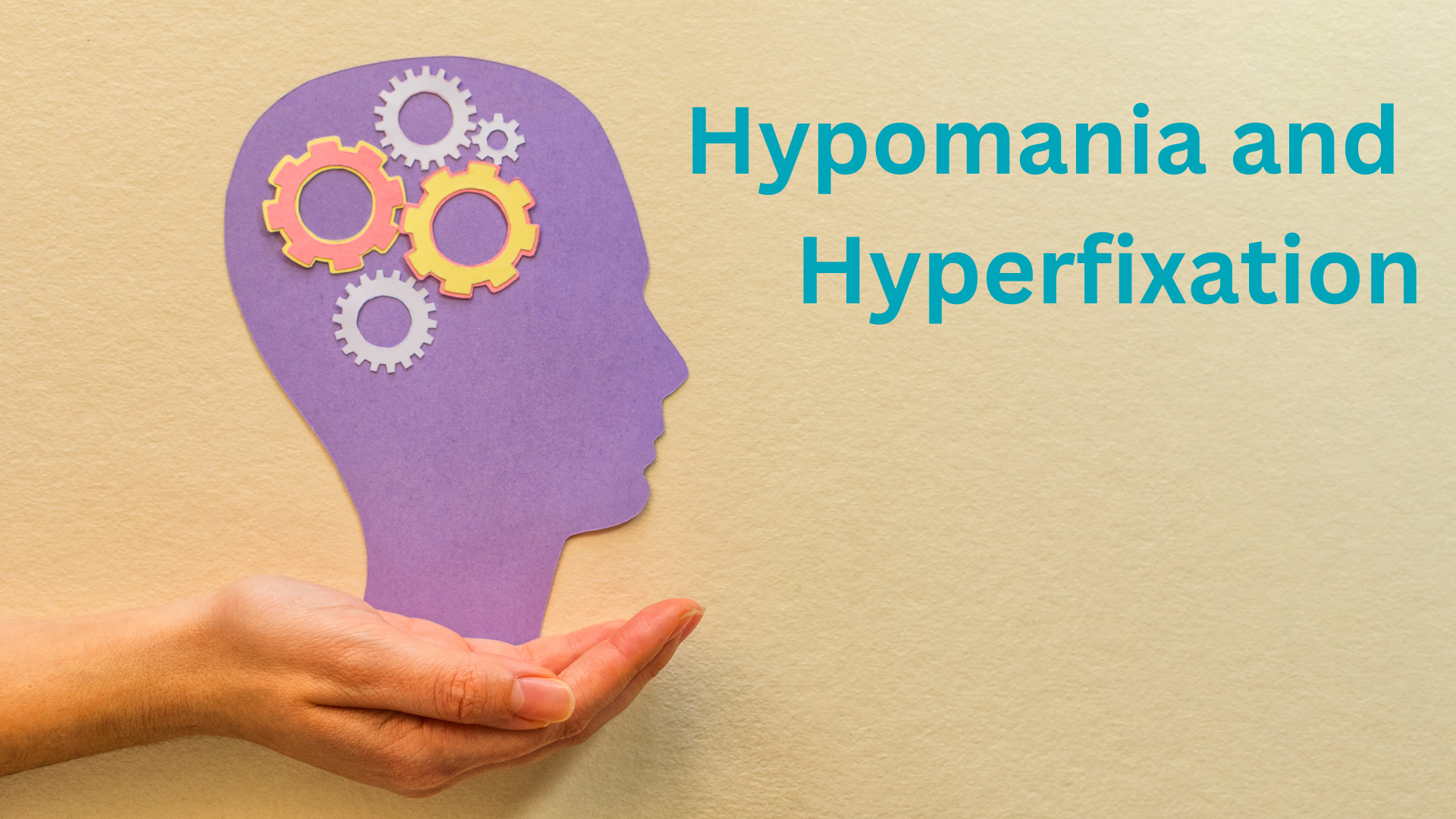
Hypomania and Hyperfixation: What’s the Difference?
Mental health conditions can manifest in various ways, and two related concepts that often come up in discussions about mental health are hyperfixation and hypomania. Hyperfixation is an intense preoccupation with a particular object, activity, or topic, while hypomania is a state of elevated mood and energy that is less severe than full-blown mania.
While both hyperfixation and hypomania can have a significant impact on a person’s life, they are distinct phenomena that are associated with different underlying conditions.
In this blog post, we will explore the similarities and differences between hyperfixation and hypomania, as well as their respective causes, symptoms, and treatments. Whether you or someone you know is struggling with hyperfixation or hypomania, understanding these concepts is an important step in seeking the right help and support for optimal mental health.
Are Hyperfixation and Hypomania the Same Thing?
No, they are not.
Hypomania is a specific syndrome that occurs in patients with bipolar disorder and is characterized by a period of at least four consecutive days during which a person experiences persistently elevated, expansive, or irritable mood and abnormally and persistently increased activity or energy.
Hyperfixation is a phenomenon that can occur in various mental health conditions. For instance, people with OCD can become hyperfixated on a specific obsession, individuals with generalized anxiety disorder may become hyperfixated on worries about the future, and those with PTSD or complex trauma can become hyperfixated on intrusive memories from the past.
Additionally, people with ADHD may become hyperfixated on projects they are highly interested in, while individuals with severe mental illnesses such as psychosis may become hyperfixated on a specific delusion.
In other words, it is clear that hyperfixation and hypomania are not the same thing.
Similarities between Hyperfixation and Hypomania
Hyperfixation and hypomania share some similarities in that they both involve a heightened state of focus and energy. In both cases, a person may feel driven to pursue a particular interest or activity, often to the point of neglecting other responsibilities or obligations.
Differences between Hyperfixation and Hypomania
However, there are also important differences between the two. Hyperfixation is not necessarily accompanied by changes in mood or energy level, whereas hypomania is a distinct state of elevated mood and activity. Hypomania is also a symptom of bipolar disorder, whereas hyperfixation may be seen in a range of conditions, including ADHD or Obsessive-Compulsive Disorder (OCD).
It is important to note that while hyperfixation may be a symptom of certain conditions, it is not itself a medical diagnosis. Hypomania, on the other hand, is a clinical syndrome that requires immediate evaluation and treatment by a mental health professional.
Hyperfixation refers to a strong and intense fixation on a particular object, activity, or topic, to the point where it becomes difficult to focus on anything else. Hypomania, on the other hand, is a symptom of bipolar disorder and refers to a state of elevated mood, energy, and activity that is less severe than full-blown mania. People experiencing hypomania may feel overly confident, euphoric, and impulsive, and may engage in reckless behavior, such as overspending, gambling, or sexual promiscuity.
How Are They Treated?
If you notice signs of hypomania or hyperfixation in yourself or someone you know, it is important to seek professional help. Here at NextStep2MentalHealth, our multidisciplinary team can assess the situation, provide an accurate diagnosis, and recommend an appropriate course of treatment.
For hypomania, treatment may include medication, therapy, or a combination of both. The specific treatment plan will depend on the severity of the symptoms, the underlying cause, and other individual factors. It is important to note that hypomania can escalate into full-blown mania if left untreated, which can have serious consequences on a person’s life and well-being.
For hyperfixation, treatment will depend on the underlying condition. For example, if hyperfixation is a symptom of ADHD, treatment may involve lifestyle modifications, therapy, medication, or a combination of both to help manage symptoms and improve daily functioning. If hyperfixation is a symptom of OCD, treatment may involve exposure and response prevention therapy, medication, or a combination of both.
It is crucial to seek help as soon as possible if you or someone you know is experiencing symptoms of hypomania or hyperfixation. Early intervention can lead to more effective treatment outcomes and a better quality of life.
We’re Here for You
If you are struggling with any sort of mental health issues — whether that’s signs of hyperfixation or signs of hypomania, seeking help from a mental health professional can make a significant difference in your life. Here at NextStep2MentalHealth, we understand that seeking help can be challenging, but we are here to support you every step of the way.
Our experienced mental health professionals provide a safe and supportive environment for you to explore your thoughts and feelings, develop coping strategies, and work towards your mental health goals. Don’t hesitate to reach out to us for help – we are here for you. Schedule your appointment here.
Learn More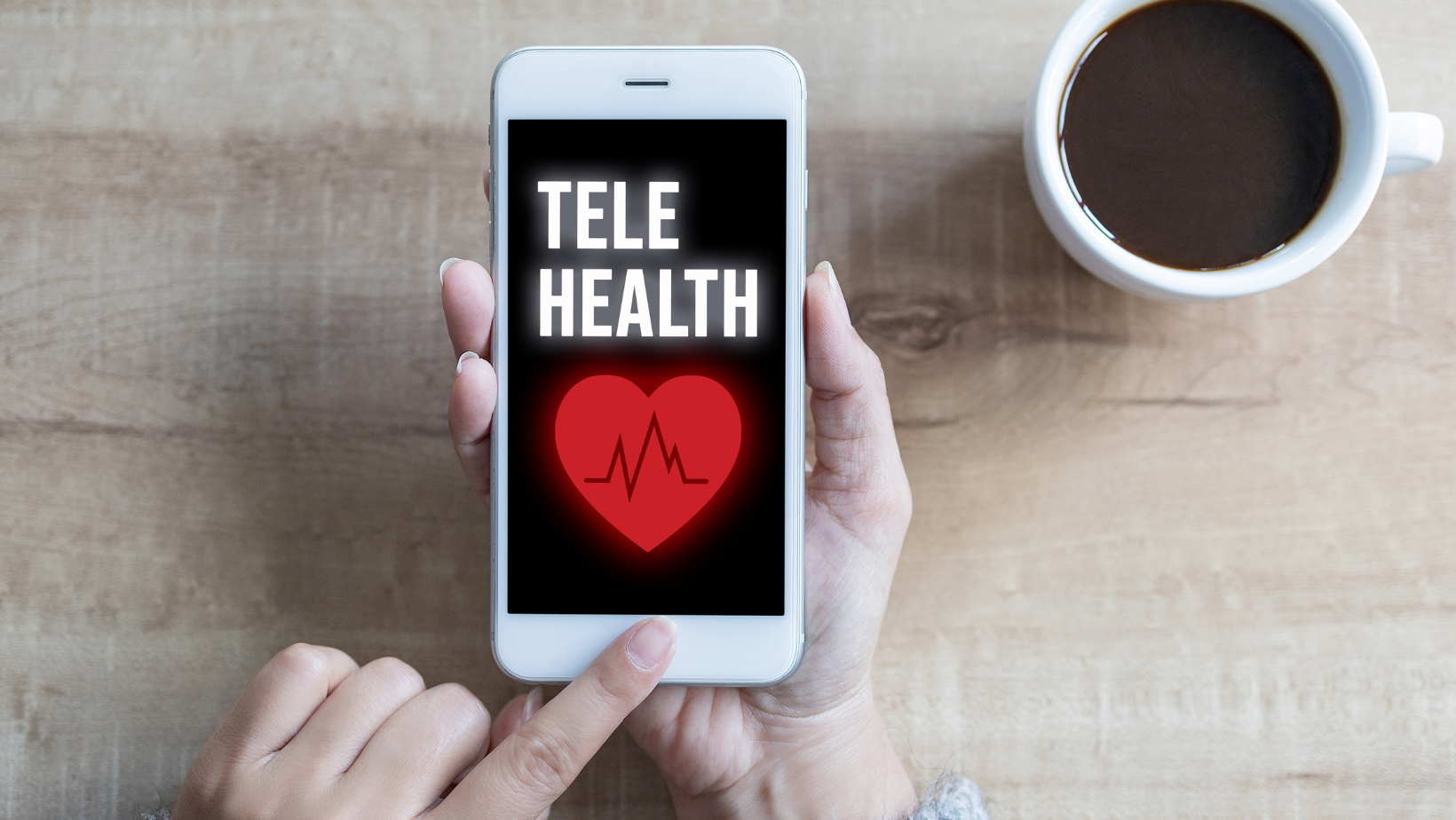
Preparing for Telehealth: What Parents Need to Know
As parents, you’ve no doubt taken your child to dentist appointments, eye doctor appointments, and annual physical exams. These routine visits are similar: arrive at the office, fill out paperwork, wait in the lobby until your name is called. But what about preparing for telehealth?
But what happens when your appointments are virtual? What do parents need to know?
Here at NextStep2MentalHealth, our multidisciplinary team is proud to offer a variety of mental health services through telehealth – and not just for adults. Children and teens can benefit from virtual care.
Below, we share five tips that parents can use to get their children ready for a virtual session.
5 Tips to Remember When Preparing for Telehealth
If your teen already uses video calling apps like FaceTime, Zoom, Google Hangouts, or Skype, then he or she already has a good idea of what a telehealth session is like. For younger children — especially those who don’t use much technology — a virtual appointment can be intimidating. Setting aside the technology, some children may feel a little nervous before an appointment, especially if they’re meeting a new provider for the first time. They may wonder what happens in therapy or what happens during an evaluation.
If your child is scheduled for an upcoming virtual appointment, it’s a good idea to prepare your child ahead of time — especially if it’s their first time experiencing therapy or an evaluation.
1. Know what type of session your child is having

At Next Step 2 Mental Health, your child can receive a variety of services remotely. This includes therapy, coaching, new patient appointments, and more.
When you know what type of service your child is receiving, it’s easier to answer their questions.
Reminder: Virtual sessions are only for non-life-threatening visits. If your child is experiencing a mental health emergency, call 9-1-1 or head to the nearest emergency room. You may also use the new 24/7 crisis hotline by calling 988 for those in crisis.
2. Gather important information before the session starts
Before your appointment begins, make sure you have:
- A list of your children’s current medications
- Your child’s medical history, including allergies, weight, and any previous diagnoses
- A list of questions that your child has (if any)
- A list of questions that you have (if any)
Depending on what type of session your child is having, you might want to write down a list of concerning symptoms that you want to address. Be prepared to answer a variety of questions, including how the symptoms have been occurring, when the symptoms are most severe, and any other related details.
3. Find the perfect location

This is one of the most important steps to having a successful telehealth session. The ideal location is quiet, well-lit, and free from distractions. Consider setting up on the dining room table or in a den. The camera should be at eye-level for your child.
If you have pets or other children, make sure they are situated elsewhere so you can focus on the session too.
It’s also important that no other children or family members can listen in during your child’s session. It’s important your child has privacy during their call.
4. Start with an introduction
You might have a telehealth session with a therapist or pediatrician that you’ve seen dozens of times. But if your child is seeing a new provider, you’ll start with introductions. Let your child know ahead of time if he’ll be meeting a new doctor so he can prepare mentally for the meeting. During the meeting, one of our providers will start by sharing his or her name and title. At this time, encourage your child to introduce himself too! After your child introduces himself, you’ll be asked to confirm a few details too. You’ll already have completed a treatment consent form, but you’ll still confirm your child’s name, date of birth, etc.
Tip: If your child is nervous (which is normal!), practice introductions beforehand!
5. Know your next steps
Before your child’s virtual appointment comes to an end, make sure that you understand the provider’s diagnosis, instructions, and/or advice.
Tip: Keep a piece of paper or notepad nearby so you can take notes during the session, if needed. Don’t hesitate to ask for clarification! We want to make sure your session is valuable and helpful.
Questions? We’re Just a Call or Click Away
At NextStep2MentalHealth, we’re happy to provide comprehensive psychiatric care and therapy for your children. Whether your child has anxiety, depression, or ADHD, we don’t want him or her to miss out on valuable sessions, and we are here to make sure your telehealth experience is successful.
Questions about preparing for telehealth? We’re just a call or click away. Give our Louisville, Kentucky mental health clinic a call at 502-907-5908 or request an appointment here.
Learn More